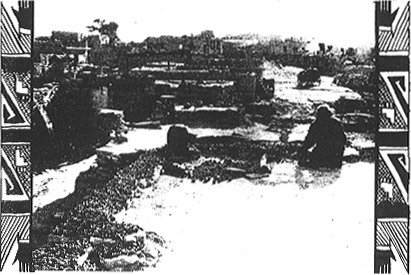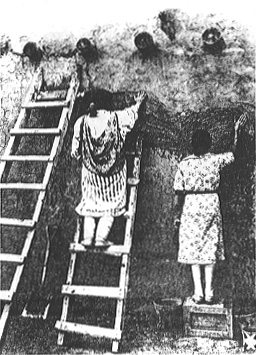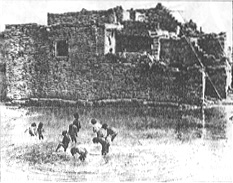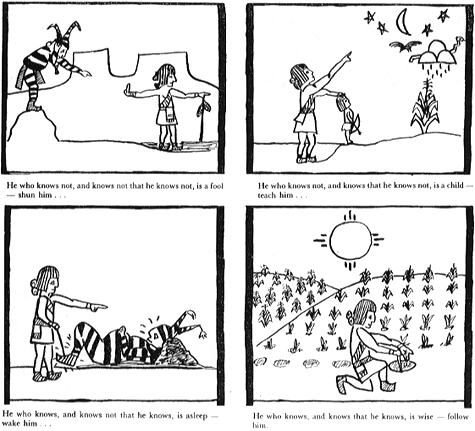

Issue Number 11
What is Hopi?
What is Hopi? What does the word Hopi mean or stand for? These questions have been on the lips of many who have flocked to Hopi land or who have encountered the Hopi visiting in their towns or cities. In the early days, when many anthropologists asked, we would proudly tell them Hopi means 'Peace' and that we are peaceful people. What does Hopi stand for, many have asked. "Well, we don't exactly know the answer but we are proud of the name." The word is used everywhere, by people in high places around their negotiating tables such as the media, television, newspapers, films, etc. It must mean something, because peace is equivalent to our name. Hopi can mean many things, such as peace to yourself and others; a by-word of obedience to the great laws and beliefs. Peace is a valuable element; without peace one cannot create harmony. That was long ago, for at this moment, Hopi is at a sad state--interpreting Hopi as peaceful could not be positively truthful. The value of the word Hopi (peaceful) seemingly has declined, for to man, peace is now becoming a playful instrument and a defensive mask or cloak for destructive weapons and armies. Yes, Hopi was our proud name, like a family tree. Sadly, clever and ambitious men can find many ways to take advantage to the hilt in order to satisfy their desires. We have printed this topic in one of our past publications. We again bring it up in this issue so our readers will not be misled into believing Hopi tribe is one big, peaceful family.
In the past, the news media, mainly the puppets' press QUATOQTI (progressive Hopi paper), strongly proclaimed that the Hopi Tribal Council and the Hopi leaders have full authority over the Hopi tribe. One can easily get misled by their false claims and portrayals to the outside world. For in fact, there are two groups of Hopis--Traditional Hopi and the Hopi Tribe.
For many years, Traditional Hopi has maintained an organized body, controlling the functions of the yearly cycles, struggling for survival based on spiritual life and nature, believing progress has less value leading only to ruin. The so-called Hopi tribe is something like a club organized just a few years ago. Only those that register can be members, but other methods of acceptance are used to keep the balance of Hopi people in their favor. Besides, the Hopi tribe is controlled by converted Hopi who, along the way, have abandoned their own original religion for greener pastures. Of course, this is strictly against the Hopi Religious Code of Law. As in other religions, once this is done the name Hopi is lost to him or taken away for losing trust in the Great Spirit.
Therefore, this newly established so-called Hopi tribe is as phony as a three dollar bill and has no right to use our name to make deals with outside interests. It would be better if this so-called "Hopi Tribe" would find another name--in respect to the Great Spirit.
It is now clear that we cannot dismiss what we have grown into. We have learned that our feelings are more comfortable within shadow of our own family tree, for it is a good shade producer, made by the Great Spirit in order to protect and defend us.

Destruction or Survival--To Follow the Hopi Way
As we have said, we have not rested since bahana (white man) encroached upon Hopi land. We thought we would rest when we moved form our mother village Oraibi--instead, bahana is now going to rest because he has created his own flock of servants and slaves out of our own brothers and sisters to do his dirty work for him. Perhaps by the time this issue reaches the public, his work will be completed.
Bahanas think everything is wonderful under the name of ecology. They think all things such as earth and heavenly bodies will last forever, but we know we have only one sun, moon and earth. If any of these were destroyed, replacing the balance would be impossible. For years our founding fathers have passed the knowledge of survival from mouth to mouth--"to respect all living things, for we are all one and created by one." It seems we have forgotten the concept of the right way of survival. Instead we have replaced survival and its way to be gotten with defensiveness. We are going steadily downhill to ruins, we mean all men on earth. We must skid to a stop for a moment and look around. There might be an old dried up root visible near you; get hold of it for support until you see the light.
We, the Hopi people, are at the stage now where we are not ashamed to say whether it is Hopi Traditionals or Puppet Traditionals that are to be followed. Perhaps we are at the epoch of time that this must come to pass; one must follow his own philosophy to meet his own end. We, the traditional Hopi of Hotevilla, have no other course to take other than the basis upon which our village was settled to fulfill the Great Spirit's instructions. We are still struggling even though we are at the threshold of defeat, and are suffering the inner pains of humiliations. We believe our strength still exists because our consciences are clear of past guilt--while the strong believe in great laws, others nibble. Soon we may have to stand alone because of those who, for their own reasons, want to hide the truth. Each of us has to defend our own philosophy to survive, so Hotevilla was settled for the purpose of fulfilling the Great Spirit's instructions.
Land and Church Struggle
Once again the Hopi Puppet Council and their supporters are granting lands to wayward neighboring Hopi and the Mormon Church--lands to which they have not title. The Council is disregarding the original Hopi Native land holdings dating back thousands of years. By doing this the so-called Hopi Tribal Council, which came into being only a few years back, continues its harsh process of extracting power from Traditional Hopis by force or coercion to dominate all of Hopi village lands. While Traditional Hopi struggle on to protect environment and culture from destruction, efforts are underway to hasten exploration and progress by artificial means thus causing great confusion for today's generation. The question now is which of these groups has more rights to the land. It has now become clear that by signing the five-million dollar deal in favor of the Puppet Council, President Carter has failed in his promise to help the minorities. No doubt Carter's action has given Puppet Council much ego power to very quickly break down the Traditional Hopi. The tactics and timing are almost perfected, and perhaps this is a test of whether the Hopis will fall in their favor.
Oliver LaFarge, author of Hopi Tribal Council Constitution, says, "Since the Indian race was a doomed and dying race, from time to time government policy must change about every 25 years--such as to de-Indianize by breaking up the tribe, destroying tradition, preventing group action, doing everything possible and impossible for the Indians to make themselves heard. Since they are foreign to our laws of process, the schemes applied cannot be understood or detected. As we see it, their task is almost finished and the acculturation is now in process as planned." Mr. LaFarge went on to say in part, "By then the oldest and most conservative would die off, the young people would have civilized themselves,a nd the Indian problem would be ended." So, Hopi at this stage went back to Tradition, a Tradition which they once degraded and spat upon.

If you support Tradition, you are looked upon as some kind of freak or lunatic, and so as time goes on both Tradition and Bahana systems will be interwoven to accomplish acculturation. This prospect of acculturation looks promising because its basic ingredient is green stuff--not corn or other things that once were the basic needs of the Hopi. This is pitiful indeed, for it will not end the problem--this system will only destroy the real purpose of Hopi, obstruct the religious principles and even end the great laws of Maasauu (Great Spirit). One cannot recapture the True Values by half-hearted actions and expect them to bear healthy fruit. We have accepted some of the Bahana things--paying for it by the sweat of our brows--that we know will not harm our system. But what we reject is that we and our future children be obligated to pay for those Bahana things that we know will harm our ways.
Mr. LaFarge continued with what he foresaw of the program, "After twenty-five years patent-fee would be issued to the Allottees and to all intents and purposes they (Hopi) would no longer be Indians. Their lands would be sold or mortgaged or otherwise used as they thought best and that would be that. There would be a gimmick into signing a mortgage which the Indian did not understand, that he must pay off--and the result would be undue cause to foreclose. Thus, the end of ownership."
In 1934, the Indian Reorganization Act was passed, giving the Tribe firm authority to both set up and run a local government under U.S. law, and to form corporations for business purposes. This provision was not only to protect wrongs done to the tribe--but also to defend themselves from outside pressures. In 1953 the Relocation Act was programmed to readjust Indians to a new life, and while this attempt failed, Indians unfortunately still desperately struggle to make this great adjustment. The last remnant of their land base will be lost unless they realize that the Indian Reorganization Act must be junked. Otherwise, their struggle will be hopeless, they will be driven to cities and towns, driven by sheer hunger, and being utterly unprepared--will land in slums, Indians without a country.
Our late chief, Katchungva, recalled, "Mr. LaFarge used to come to my house or to my field every day for a week. I guess he was very desperate to have me accept the Hopi Constitution. He followed me everywhere saying that others had accepted it. I think he was a good man but very, very persistent. I did not yield, because if I accepted the Constitution, it would be the end of Hopi. Finally he came to my house with his bed roll--I suppose to wear me down to submission. But before he had spent one night, I was asked by my people to get rid of him by sundown. So I told him, through an interpreter, that he must not stay, and I told him that my final word was that I would not accept or sign anything. He did not persist and obeyed my wishes. Before he left he thanked me for my kindness, honored my courageous stand, and thought I did right telling him my opinion of the Hopi Constitution he had drawn up. He told me that I did not have to follow it, that it may not be good for everyone and that maybe it was useless for me or would someday become useless. So he apologized by saying that he had tried to persuade me--not because he wanted or had to--but rather because it was his job by which he earned his living.,"
Now we are at the period where we must decide and our conclusion will probably not fit everyone. Surely no Hopi will deny that Tradition is real, that it is our inherited cultural beliefs, our religious doctrine, our unwritten instructions used as a guideline. But most of us have forgotten the real thing and have substituted fabrications. We know our philosophical doctrines and prophecies vary from village to village, but when we really look at Tradition we see that it has the same meaning for all. We all enjoy the social or Traditional gatherings, we attend Bahana religious things for reasons we need not spell out for you because we trust you will understand.
Now, a survey about the Land Claim has been taken among the Hopi, but the majority of Traditional Hopi--90% to 95%--have not even been consulted about confirmation of the Claim. Perhaps now the world will think the Traditional Hopi have confirmed the Claim and accordingly both people of high places and common people will make the same assumption. Therefore, the case of our problem is now set before the people who care about our survival and who are trying to better resolve this problem by helping to save our environment.
So, now it is up to each of us to confirm our stand as to whether we should save the aboriginal ways. It is not very simple but one has to decide which side to support--Progressive Hopi or Traditional Hopi--or to break free from both. Consult yourself and help get the pattern in motion.

Education--Or the Hopi Way?
Recently the Committee on Education of the so-called Hotevilla Bacabi Community School made a survey seeking advice from certain Hotevilla people. The survey questioned whether the School should be run by Hopi Tribal Council, the Bureau of Indian Affairs, or by Hopis themselves. This issue, based on the law of "self-determination," will decide how the School should be operated.
Funding is provided by the government, but no matter who runs the School, we traditional people of Hotevilla refuse to cooperate. In the past, when the Oraibi leaders accepted a similar program, we were forced to accept the white man's education. Whatever decision is made, the end result will be the same.

 The shield symbol with its four
The shield symbol with its fourcircles in four quadrants means:
"Together with all nations we
protect both land and life, and
hold the world in balance."







No comments:
Post a Comment